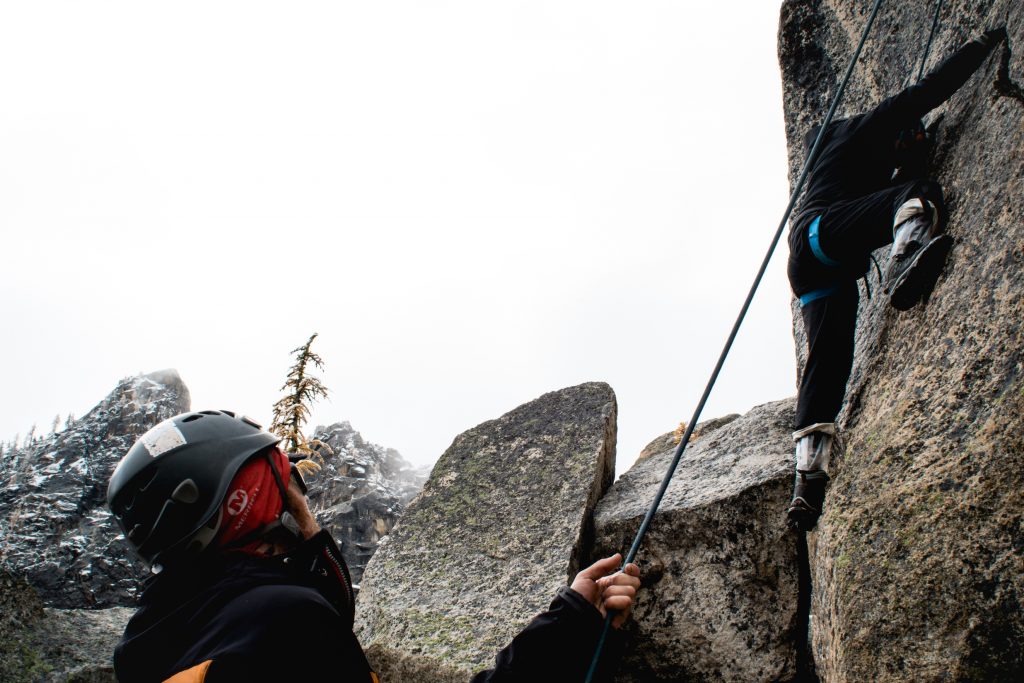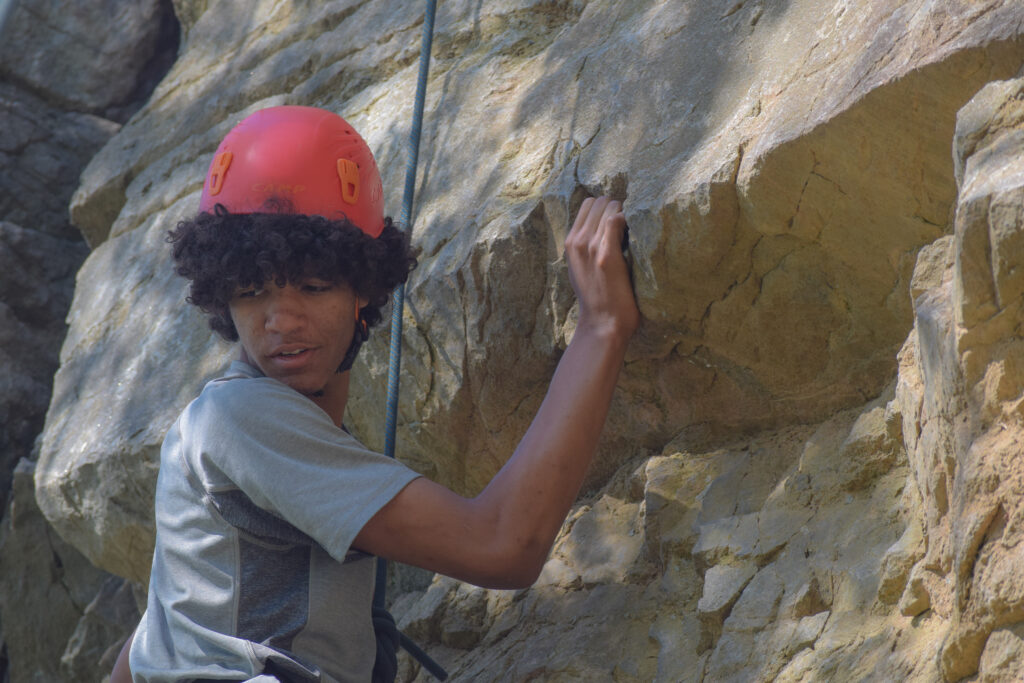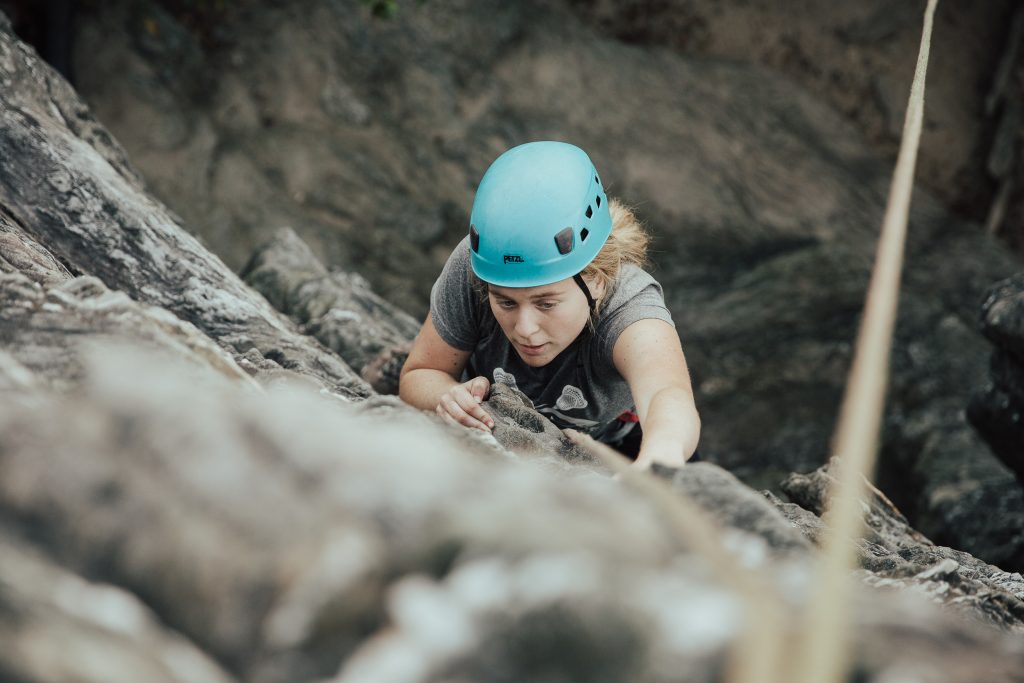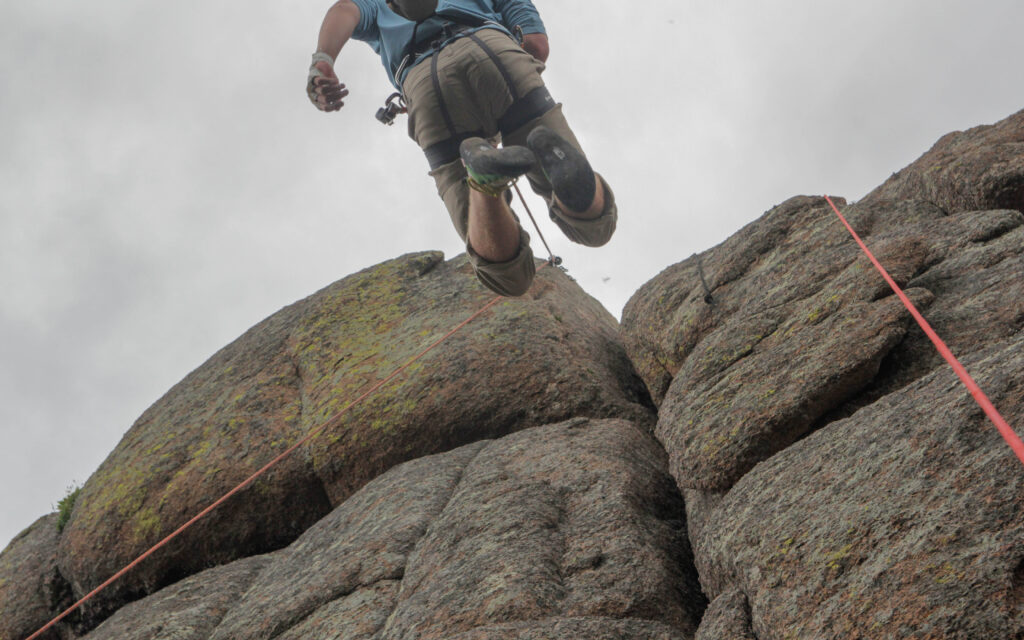Rock climbing offers you a unique perspective, leaving you with lessons and applications that will impact your life.
My journey with rock climbing has been an imitation of life in so many ways. There are moments of flow in which everything is perfect and I couldn’t be happier, and of course, there are even more moments of fear and frustration. Sometimes you’re standing on top of an epic spire and sometimes you’re crying at the base of a wall. That’s life.
Climbing for me has always been an avenue for self-exploration. As an Instructor on Outward Bound courses, I will ask students to draw connections between their experience rock climbing and their “normal” life. There are a few themes that I see time and time again. The life lessons that follow come from my personal toils up on the wall, as well as, the insights students have shared with me while on course.

Photo by Charis Nichols
Trust Your Partner
Imagine that you’re 40 feet up in the air on the side of a cliff, tied into a rope. You look down at your feet. Just your toes are resting on a very small bulge in the wall. Beyond your toes, you look down to the ground and see your belay partner. Someone who literally holds your life in their hands. Nerves begin to build and the fear of falling sets in. However, the truth is the fear of falling is way worse than an actual fall. Why? Because your belay partner will catch you using the rope system set up in place for exactly that—falling. The adrenaline you feel comes from being up high and considering a fall, but a large amount of the discomfort comes from the fact that if you do fall, you are not the one in control. Your partner must catch you.

Photo by Ethan Goldstein
Control, power and efficacy over our lives is a valid and universal pursuit. Climbing puts you in situations that force you to relinquish control. Before I leave the ground, my partner and I will do all the proper safety checks to ensure a successful climb, but ultimately, my participation in the sport depends on my faith in another human. Climbing has taught me to trust others and relinquish the idea that I can do everything by myself.
Trust Yourself
On our outdoor courses in North Carolina, most of our climbing with students, and on our own, is a style of climbing known as slab. Slab climbing places emphasis on footwork, and the concept of “trusting your feet”. If you look at a slab of rock, it may look like there are zero holds. But the angle of the rock, plus the friction with your shoes, plus a heap of courage, is the winning equation that can get you to the top of the climb.
“Slab climbing taught me to hang in the discomfort. To take a breath, have faith in myself and not give up.”

Photo by Rachel Veale
We teach our students to keep “nose over toes” which means stand up straight – this is when the friction between your shoes and the rocks is the highest. A fear reaction while up on the wall is to lean into the rock to hold on tight. It’s only when you lean into the wall that you unweight the friction power that the climbing shoes hold. In other words, seeking a moment of stability and comfort is actually what will make someone fall.
Sometimes in life, we’re standing on the metaphorical slab, and it’s only a failure to face the moment that brings us down. Slab climbing taught me to hang in the discomfort. To take a breath, have faith in myself and not give up.
Compassion (Self-Love)
Climbing is an intimidating sport to get into. What I’ve found since “getting into” climbing is that the intimidation doesn’t stop. Imposter syndrome is always present—am I a real climber? Will I ever feel legitimate? With my personal climbing, I am always in pursuit of more—bigger climbs, higher grades, more gear. Climbing progression is not linear, and this has been the toughest lesson of all for me.

Photo by Griff Jones
Fitness fluctuates, time and financial freedom are ever-changing, and partner limitations are very real. With what feels like so much to be done, and with so much expectation, giving ourselves grace and gratitude become key to success. Too much expectation in any arena will lead to dissatisfaction.
Last fall I climbed a few times a week, and at much harder grades. These days, I don’t climb nearly as hard because I am instructing courses in the field, and that’s totally alright. I see climbing as a lifelong practice of assessing what I need and being okay with where I’m at. If I can be thankful for my health, for the opportunity to climb at all, and for time enjoying the outdoors, then it is always a successful climbing day.
About the Author
Addie Hurwitz is a field Instructor for the North Carolina Outward Bound School, primarily out of Table Rock base camp. Addie has a degree in Recreation, Park, and Tourism Management from Penn State University. She loves working in experiential education and takes similar joy from studying its academic side. When not on a course, Addie is likely skiing or traveling.
OTHER POSTS YOU MAY LIKE
Read More
Read More
Read More




